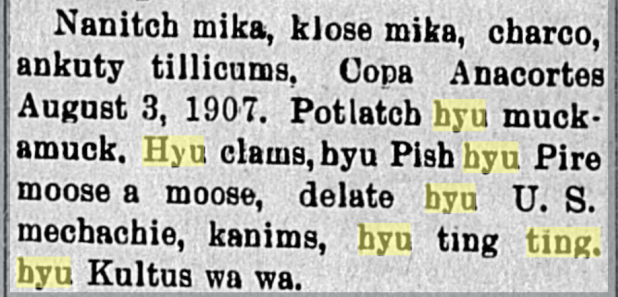1907, Anacortes, WA: “Hyu ting ting” invitation
A neat example of untranslated Chinook Jargon in a local newspaper!
However, you can always click to read the original issue, where essentially the same things as the following are indirectly said in English.
The locals, as we normally find in such a case, understood the invitation perfectly well. Despite the post-frontier timeframe, many still knew Jargon in northwestern Washington state. Plus, as I said, they could piece it together from earlier in the same article. And the event in question was being talked about all over town.
Beware of real bad punctuation in what follows. That’s a constant problem when you’re reading old Jargon…you have to read with a critical eye.
I’ll add my interpretation after I show you this clipping, to add to our bulging files of Chinook invitations:

Nanitch mika, klose mika, charco,
ankuty tillicums, Copa Anacortes
August 3, 1907. Potlatch hyu muck-
amuck. Hyu clams, hyu Pish hyu Pire
moose a moose, delate hyu U. S.
mechachie, kanims, hyu ting ting.
hyu Kultus wa wa.
— from “The Pioneer Association”, in the Anacortes (WA) American of July 18, 1907, page 2, column 4 (continued from page 1, column 5)
Okay, now to translate the Chinuk Wawa for you:
- Nanitch mika, =
nánich, mayka =
‘Look, you! ~ Hey, you!’ - klose mika, charco, ankuty tillicums, Copa Anacortes August 3, 1907. =
łúsh mayka cháku, ánqati-tílixam-s, kʰupa anakʰórtəs* ágəst 3, 1907 =
‘You should come, oldtimers, to Anacortes on August 3, 1907.’ - Potlatch hyu muck-amuck. Hyu clams, hyu Pish hyu Pire moose a moose, delate hyu U. S.
mechachie, kanims, hyu ting ting. hyu Kultus wa wa. =
pátlach háyú mə́kʰmək, háyú kláms, háyú písh, háyú páya músmus, dléyt háyú yú-és* masáchi-kəním-s, háyú tíngting*, háyú kʰə́ltəs-wáwa =
‘(We’ll be) giving lots of food, lots of clams, lots of fish, lots of roasted beef, quite a lot of US warships, lots of music, lots of conversation.’
That last sentence has no subject; I inferred that it would be nsayka, for ‘we’.
An alternative view could be that the Settler writer of the invitation was thinking of the word “potlatch” in the way it’s used in Pacific NW English — as a noun for ‘a giveaway; a party’. Then you’d have an interpretation like “There’ll be a potlatch of lots of food…etc.”
A last note. This ting ting is a less common, but not exactly rare, Settler variant of tintin, the word for ‘bell; music; noise; clock’.
